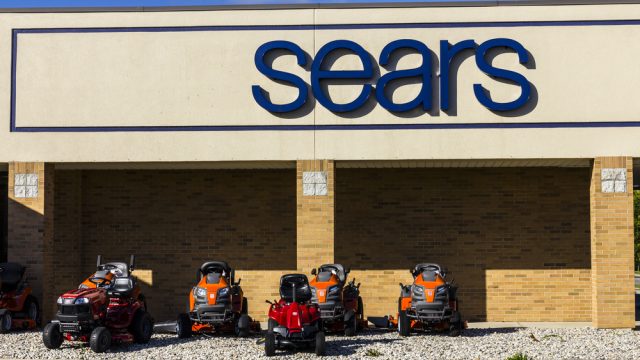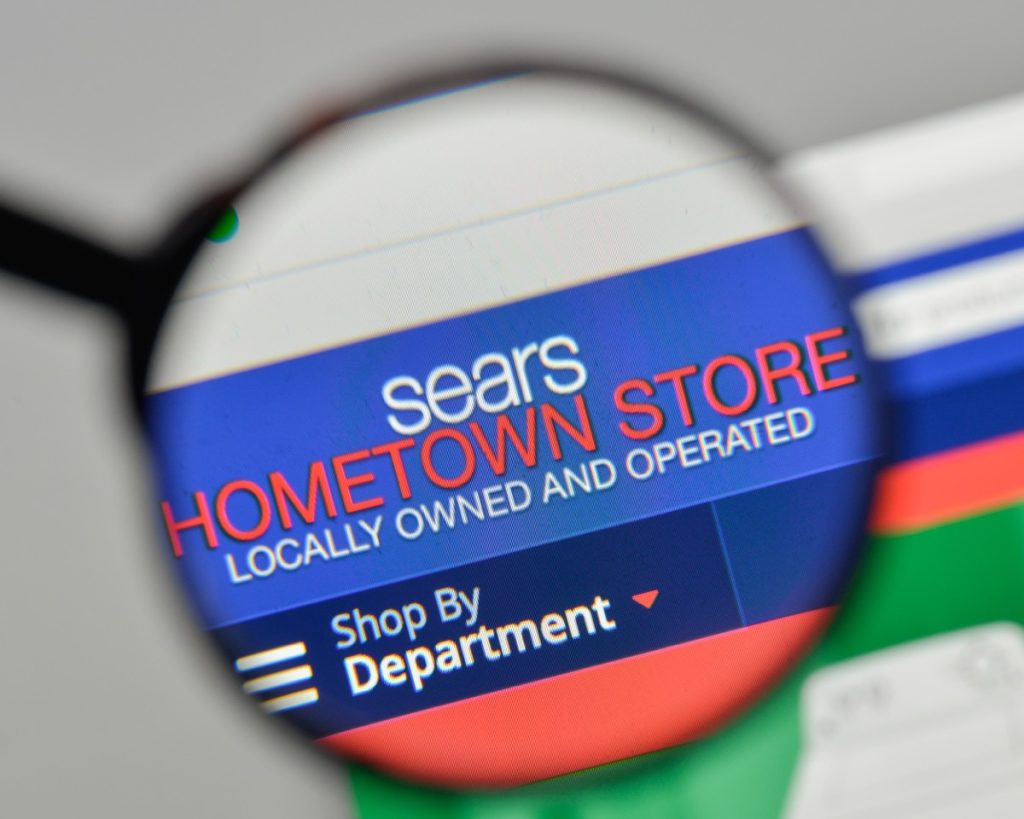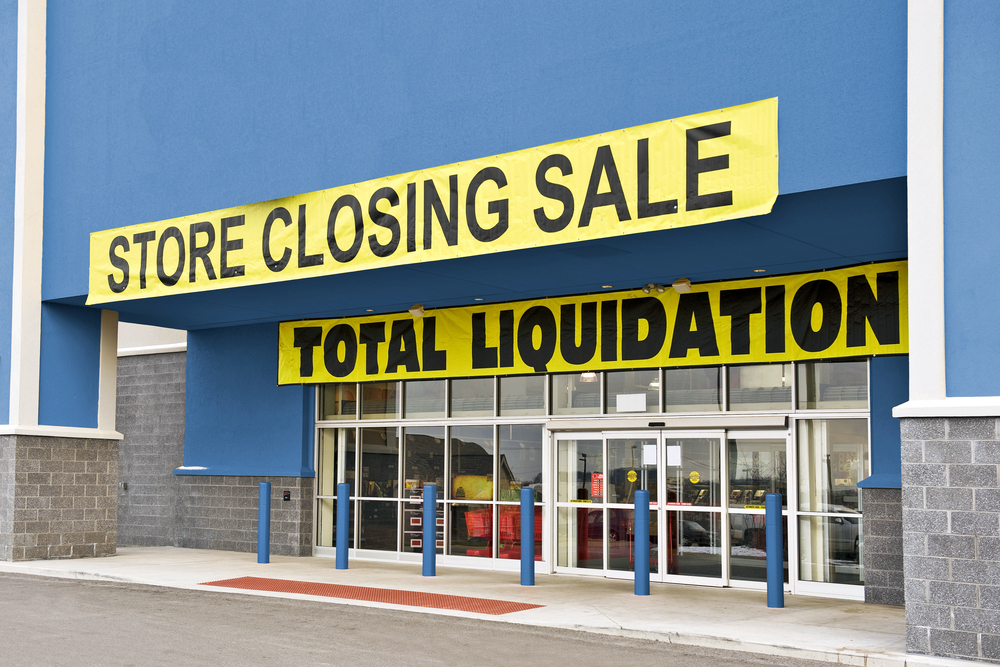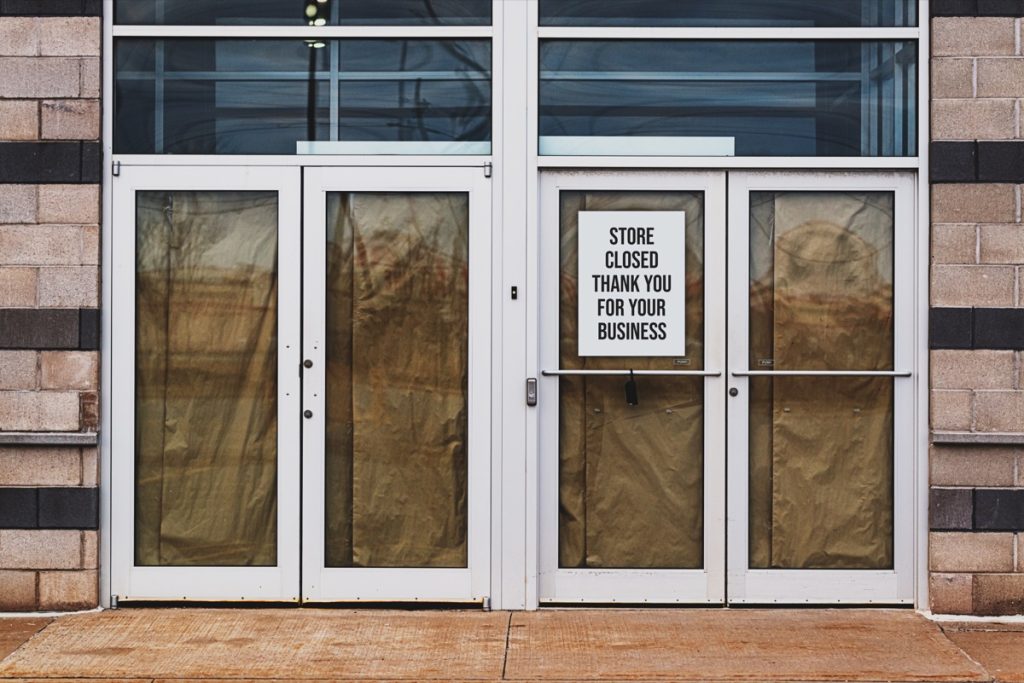Sears Hometown Stores Just Filed for Bankruptcy Amid "Rapid Downward Spiral"
The once iconic store just hit its latest stumbling block.

Even if you feel like you've heard more about Sears recently than you have in a while, it's likely not for the best reasons. Over the past decade, the once-iconic retailer and the cornerstone of many local malls has seen a dramatic reversal of fortunes. Today, the company is struggling to stay afloat while subsidiaries like its Home & Life and Appliance & Mattress locations continue to dwindle in number. And now, its Sears Hometown stores just filed for bankruptcy amid what the company calls a "rapid downward spiral." Read on to see what this news means for the fading retail giant.
READ THIS NEXT: Big Lots Just Announced "An Accelerated Number of Closures".
Sears Hometown stores just filed for bankruptcy as the retailer's woes continue to build up.

It appears there's more trouble ahead for the nation's once-largest retailer. On Dec. 12, Sears Hometown Stores Inc. filed for bankruptcy in Delaware court, Bloomberg reports. The subsidiary branch of the department store giant said that it had at least $50 million in liabilities with less than $50 million in remaining assets in its court documents.
The smaller format stores are a fraction of the average Sears department store size, ranging from about 8,000 to 10,000 square feet versus 160,000, respectively, CNN reports. The shops also feature a limited inventory by comparison, focusing on tools, lawn care equipment, and appliances rather than the broad offerings of the larger stores.
The subsidiary company was sold off and eventually repurchased by Sears in recent years.

The news is the latest in a tangled saga that has played out over the last decade, beginning with when Sears Hometown was initially spun off in 2012 in a move to raise cash for the struggling retailer. As Sears slogged through the decade after its merger with Kmart, its new parent company Transformco eventually reacquired the nearly 500 stores just seven years later—just a year after declaring bankruptcy itself, Retail Dive reports.
At first, the company attempted to liquidate its recent purchase in 2019. But the move was stopped when former Sears chief executive and current TransformCo CEO Eddie Lampert took drastic steps to prevent it by replacing board members and changing the company's bylaws, Retail Dive reports.
The stores' following act made it appear as though Sears Hometown Stores were the company's best chance at securing its future for a moment. In a statement to USA Today in Sept. 2021, TransformCo said that its "go-forward store strategy for Sears and Kmart is to operate a diversified portfolio consisting of a small number of larger, premier stores with a larger number of small-format stores." The company said this included the more than 300 Hometown Stores that were open at the time, which are "primarily operated by independent dealers or franchisees of an affiliate of TransformCo."
But in its filing, Sears Hometown says its current position is the result of still depending "substantially on TransformCo to provide key products and services" even though the parent company has failed to show any support. Disputes over this arrangement have increased in the last year and exacerbated the store's struggles, writing that a "lack of inventory has caused a rapid downward spiral that contributed to the filing of these Chapter 11 Cases," per Retail Dive.
RELATED: For more up-to-date information, sign up for our daily newsletter.
The bankruptcy comes after a year that saw a major wave of Sears Hometown Stores closing.

Sears Hometown Stores are also entering bankruptcy after years of seeing its once sizeable footprint shrink. Today, the company is down to just 121 stores across the U.S., marking a significant drop from their one-time high of more than 700, CNN reports.
The past year has been particularly difficult for the retail subsidiary. In May, more than 100 Sears Hometown locations announced they were closing—accounting for about half of all remaining stores, CNN reported.
Many of the independent store owners took to social media to announce their final days and promote liquidation sales, with some citing that the decision to shutter wasn't theirs. "I want people to know that this is not happening because the community did not support us," Teresa Busbee, owner of a Sears Hometown Store in South Carolina, wrote in a Sept. 15 Facebook post. "It was nothing to do with the community or ownership. It was strictly a corporate decision made by Sears. We got caught up in this wave of closures, and there's another coming. There are no more Sears stores in South Carolina."
Experts say Sears Hometown didn't necessarily have to suffer this fate.

But while the now struggling subsidiary may face a tough road ahead, some experts argue that the company was once primed for success. Compared to the large department stores—which have dwindled to just 15 locations—Sears Hometown Stores' honed-in selection, widespread locations, and intimate shopping settings made it a viable competitor at one point. Unfortunately, that no longer appears to be the case.
"In practice, these advantages were squandered," Neil Saunders, managing director at market research firm GlobalData Retail, said in comments released to clients via email on Dec. 13, per Retail Dive. "TransformCo has done very little to market and promote Sears Hometown, nor has it done much to differentiate the chain. Instead, it has followed the similar pattern of continual decline that has been the hallmark of Sears, with hundreds of stores closing earlier this year."
"The benefits of having access to unique merchandise via exclusive products has also been lost as the various brands Sears once owned have been sold off and are now distributed more widely across retail," he added. "Bankruptcy will allow various assets to be sold off and will likely give TransformCo flexibility in deciding how to distribute its remaining brands and services."





















